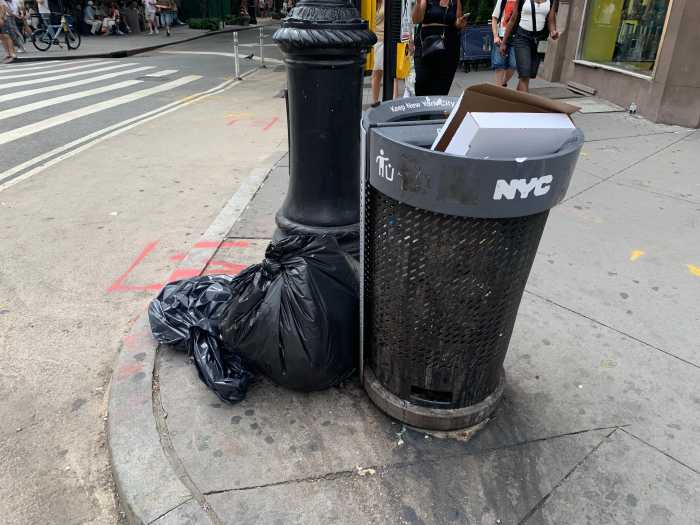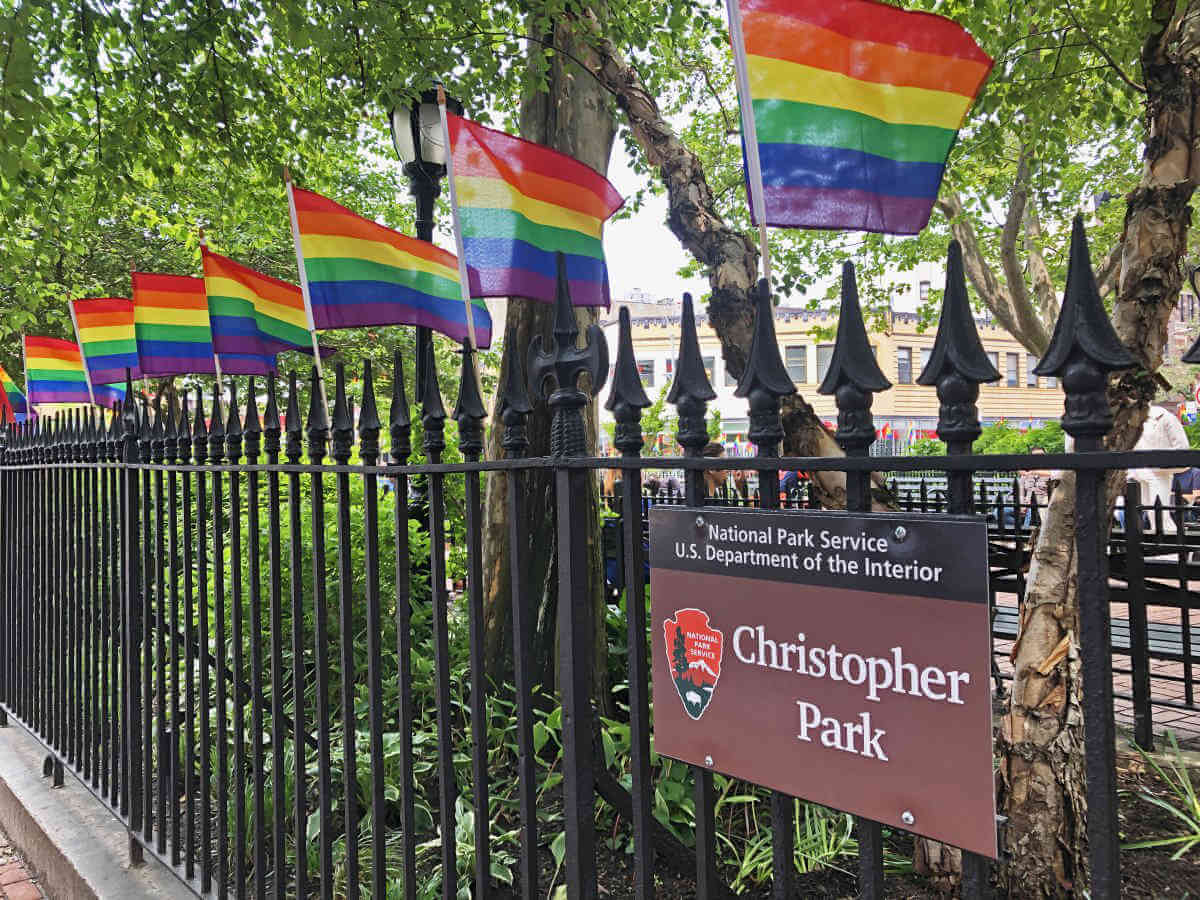Can’t pay triple the rent
To The Editor:
I learned from Avignone’s owner, Abe Lerner, that this historic shop will be closing on April 30. Why? The building has been sold, the store’s lease is up for renewal, and Avignone’s new landlord is tripling the rent. Abe had indicated his willingness to negotiate a new lease with a higher rent, but one that’s three times what he is now paying is out of the question.
Avignone — one of the Greenwich Village Society for Historic Preservation’s 2013 Village Award winners because of their integrity, history and supportive involvement in the neighborhood — has been at 226 Bleecker St., just west of Sixth Ave., since 1929. Francis Avignone moved it there from 59 MacDougal, where it had opened as the Stock Pharmacy in 1832. (Francis Avignone had bought and renamed it in 1898.)
Avignone has maintained an important role in the neighborhood community all of these years, continuing despite loss of its pharmacy to CVS a year ago. They contribute to Churchill Park and Our Lady of Pompeii’s senior center and sponsor a Little League team.
The conveniently located store provides a spectrum of basic products for home and health needs, with an ecologically responsible perspective wherever possible, and a wonderful selection of botanical products for skin and hair. Prices are often below those elsewhere in the neighborhood. And the store is a treat for the eyes, as well.
It is shameful that there is still no law protecting such businesses and preventing the further destruction of the character of our neighborhoods, and the fabric that keeps our communities vital.
Sheila Sperber Haas
No to faux Chumley’s
To The Editor:
Re “Chumley’s foes file appeal to block reopening; Hope to 86 historic watering hole” (news article, Jan. 8):
Is it even Chumley’s anymore? I have watched the construction since day one and it looked like the entire building was gutted and a new place was built behind the facade. Not sure it is really Chumley’s or just a “Disneyfied” version of it. Do we need to protect it as the “site where Chumley’s once stood?”
As far as the B&T and tourists comments: It really has gotten difficult for those of us who have lived in the neighborhood before the TV show “Friends” ever filmed on that corner. People stand in front of my window with a bullhorn yelling at their tour groups. Others vomit in out plant stands after a long night out.
I think the anger about the noise in our residential neighborhood is more than just one bar on one block.
Karen Butler
Writers need Chumley’s
To The Editor:
Re “Chumley’s foes file appeal to block reopening; Hope to 86 historic watering hole” (news article, Jan. 8):
Writing is a horribly lonely vocation, and some of the writers who visited Chumley’s were the saddest people who ever lived. But despite their personal tragedies, they told us stories about life in a way that made life seem more beautiful and more worth living, for generations upon generations to come. How generous, my God. What a gift.
Chumley’s gave them, in return, however briefly, some moments of sustenance. And there are writers now who are waiting for that same thing. You can’t get it just anywhere. There are pockets where the past isn’t so distant — writers need that — and Chumley’s is one of those rare places.
Some things deserve personal sacrifice, and literature and history are two of them. Neighborhood opponents will realize that the people writing Chumley’s future have good hands and good hearts and you can trust them.
Clare Gailey
We don’t need charters
To The Editor:
Re “Charter debate hits Community School District 1” (news article, Jan. 8):
As a District 1 elementary school parent, I can tell you that our neighborhood has many incredible public schools — most of which are severely overcrowded as it is, and all of which are chronically under-resourced.
We don’t need parasitic charter schools, bankrolled by hedge funders and backed by Albany opportunists, swooping in to steal scarce classroom space and public funds away from our schools. And many of our schools are genuinely innovative — unlike discipline-fetishizing, test-centric charter schools, which goose their test scores by cherry-picking the most advantaged students and casting aside special-needs kids.
Let some other district serve as a laboratory for this twisted experiment, wherein disadvantaged kids are separated from more disadvantaged kids in order to game the testing system and pay people like Ms. Moskowitz half-million-dollar salaries. Or better yet, let those schools rely solely on the generosity of their high-rolling funders, and let Albany instead fund our public schools adequately enough to compensate for our city’s grotesque inequalities.
Matthew Arnold
A shot of Tequila
To The Editor:
Re “Oink if you love Doris! Parties keep on coming” (news article, Jan. 1):
Tequila Minsky’s photos and the accompanying article really captured the essence of the party. There was a lot of love shared that evening. We would also like to acknowledge our co-host Erin Rogers, who provided the fabulous handcrafted party favors and the unbelievable cake that rocked the house. Thank you, Tequila, for sharing your lovely energy.
Hellen and Harvey Osgood
Bus service is a bust
To The Editor:
I have contacted many politicians about the very poor bus service here in the East Village, but have gotten zero response.
I have, in the past few years, become a user of the M14A crosstown. The Downtown Select bus does not stop at E. Ninth St. as the limited bus did. As a result, there is a 17-block distance from 14th St. to Houston and Allen Sts.
Usually, when the bus was limited service, I would get off at the E. Ninth St. stop and walk a few blocks to Avenue A and E. Sixth St. Now I get off at 14th St. and change for the 14A. The ostensible schedule is every 15 minutes between buses — but the reality is 25 minutes or more.
Also the ratio is allegedly three 14D buses to one 14A. It is more likely five or more to one. Last week it was nine 14D to one 14A, after a 30-minute wait. Most of the latter D’s go by empty.
The 14A bus has a mix of passengers — white ethnics, Latinos, African-American, poor, the new gentrification citizens — who need public transportation.
The Second Ave. Select bus stops at 34th, 28th and 23rd Sts. to accommodate those going to and from the hospitals on First Ave. But it’s crazy to skip the East Village stop at Ninth St., creating a 17-block distance to the next stop.
So now the transfer I make at 14th St. becomes imperative. Again, I have written to our local politicians, and gotten no reply. State Senator Daniel Squadron has an electronic response, but nothing else.
Who will help solve this bus-service crisis?
Bert Zackim
Focus on the problems
To The Editor:
Re “Another angry sea of blue” (photo story, Jan. 8):
I think the police union is acting like the police rule New York City. While we, the people, are saying that some police officers are rude, racist and gung ho, the cops think they are living in the wild, wild West.
Whatever happened to shoot to stop, not to kill? New officers are not trained to bring these criminals to justice. They’re trained to shoot to kill, and that’s not correct.
We, the people of New York, ask that you, the N.Y.P.D., respect the lives of our babies and black and Hispanic men. We want justice for our murdered babies and fathers — just as the N.Y.P.D. would want justice for their murdered brothers in arms.
Simply address the problems. Mayor de Blasio doesn’t owe the N.Y.P.D. anything. He was elected by the people, for the people, period.
Denise Snell
Lenape Jersey pot jobs
To The Editor:
New Jersey’s native people, the Lenape, who were forcibly exiled to bleak reservations in Oklahoma and Kansas, should be invited to return home and start a pot business.
Fort Monmouth, a recently closed U.S. Army base in central New Jersey — near New York City — with the infrastructure of a city, would make an ideal location for the first Lenape reservation in our state.
The persecution and exile of the Lenape from New Jersey is eerily similar to the South African system of apartheid. Under apartheid, many blacks were shipped off to faraway “homelands,” where they were stripped of their limited civil rights.
The federal government recently stated that tribal governments would be allowed to legalize marijuana in their jurisdictions for medical and recreational use, as numerous states already have.
A legal marijuana industry operated by the Lenape in New Jersey would provide the necessary income for a successful return of the tribe. Fort Monmouth could become home to a vibrant Lenape-run cannabis industry that would provide jobs for people of all backgrounds.
Call Lieutenant Governor Kim Guadagno and tell her that now that Fort Monmouth is no longer in use by the federal government, the land should revert to its original owner, the Lenape nation.
Eric Hafner
E-mail letters, not longer than 250 words in length, to news@thevillager.com or fax to 212-229-2790 or mail to The Villager, Letters to the Editor, 1 Metrotech North, 10th floor, Brooklyn, NY, NY 11201. Please include phone number for confirmation purposes. The Villager reserves the right to edit letters for space, grammar, clarity and libel. The Villager does not publish anonymous letters.







































